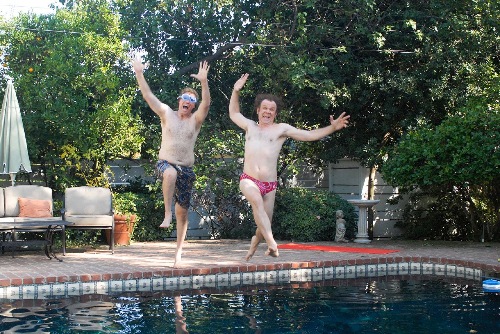The Russian/Mongolian/German/Kazakh epic Mongol is the latest in a trend of films that reflect a current fascination with the origins of our heroes and villains. After Batman, Leatherface, Michael Myers and many others comes the origin story of a real-life figure, Genghis Khan, but the hushed, reverent tones typical of historical biopics are absent here. Loosely translated from already-patchy sources, Mongol renders the Khagan's life in bold, bloody strokes that have more in common with Marvel Comics than David Lean. Which is not meant as a putdown - Mongol is a movie dedicated to the thesis that Genghis Khan was bitchin'. And, for the most part, it succeeds admirably.

The film is focused on young Temudjim (Odnyam Odsuren as a child, Tadanobu Asano as an adult) as he is captured and forced into slavery, undergoes a Conan-like adolescence and emerges a great warrior determined to unite his people and attack Mr. Kim's City Wok. Except for that last part. One thing that is notable about Mongol is it's disdain for exposition - it occurs to Temudjin that he should unite the Mongolians, and then he does it. Director Sergei Bodrov seemingly has little interest in exploring the psychology of Genghis Khan, preferring to let the film's stunning landscapes and its harrowing battle scenes speak for the character. Khan's wife Borte (Kulan Chuulun) observes that "All Mongols do is kill and steal," and while this isn't true of acutal Mongolian culture, but Bodrov's film is less about the rise of an empire than smashing, chasing, stabbing and bleeding. Luckily, the battle scenes are genuinely impressive - immersive, visceral, perhaps a little too clean (visually, not literally, as there's plenty of blood and mud) but demonstrating a strong understanding of the manipulation of space and scale. The battles work both as a nod to old-school epic filmmaking and as a superior example of a digital-era action movie matched by an equally anachronistic score I can only describe as Tuvan hardcore.
Bodrov is interested in humanizing Khan in one way - we learn that he was a superior lover who penetrated his wife with the same skill that he impaled his enemies. And while the scenes of Temudjin and Borte sharing butterfly kisses or frolicking in a meadow with their offspring are jarring, there's something almost cute about the idea of the Khan as truly being motivated by the love of a woman. My friend Michael informs me that Mongol is the first in a planned trilogy, and it will be interesting to see if Bodrov's Khan is ultimately more lover than fighter. Of course, this Temudjin represents an ideal, if not for Bodrov, than for its audience, which could explain its massive appeal. According to the movie's Wikipedia page, Bodrov admitted to fabricating much of his story to "fill in the holes," but insists his version is accurate because he knows Khan so well. I'm sure there are a lot of Asian culture-worshipping twentysomething males out there who know exactly how what Bodrov means.

I'm also pretty sure that Dale Doback (John C. Reilly) and Brennan Huff (Will Ferrell), the titual protagonists of Step Brothers, would agree that Mongol is the best movie ever. While the basic concept of Step Brothers - two forty-year-old guys are forced to move in together when their parents marry - is as simple as Mongol's, I've yet to read a review that talks about what a strange, fascinating experiment it is. Casting a top comic actor with a clearly defined persona (blogger Dr. Criddle once described Ferrell, as "an arrogant sack of meat," which pretty much sums up his appeal to me) with one of our best character actors (fresh off his leading-man triumph in the underrated Walk Hard) results in a darker movie than the previews suggest. If all Mongolians do is kill and steal, all Dale and Brennan do is hit each other and the head and curse, and for a while Step Brothers runs the risk of becoming completely one-note. But Ferrell and Reilly actually make their characters believable, and the film is unafraid to follow them into strange territory - you expect them to beat each other up, but you don't necessarily expect to see them hi-fiving as they compare their penises.
Supported by Mary Steenburgen and Richard Jenkins (honestly, as good here as in The Visitor) as the parents and Adam McKay's direction - his skills with capturing and assembling largely improvised comedy puts Adam Sandler's repertory of hacks to shame - Step Brothers is surprisingly credible for a movie with fart jokes. In retrospect, the Ferrell/McKay trilogy are all about dim-witted protagonists who learn an obvious but important lesson; in a genre dominated by fratboy misanthropy, they seem downright progressive. It's more uneven than the previous McKay/Ferrell collaborations, but between the weird asides and supporting performances (Kathryn Hahn as Ferrell's sad, horny sister-in-law nearly steals the movie) and the committedly asinine work by the leads (even Reilly's reaction shots crack me up), it's hilarious and strangely moving. By the film's end, you're rooting for Dale and Brennan to find their own version of success; perhaps this is the beginning of a trilogy?
3 comments:
nice post of smoke weed with johnny hopkins also visit my new post in Amazing blog ,
jack ,
deaty.please add my blog in to your fiends link list.
It can't work in fact, that is exactly what I believe.
Oh my god, there's a lot of helpful info above!
Post a Comment